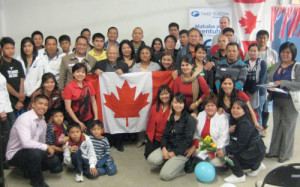Filipinos 2nd most fast-tracked for Canadian permanent residency
RED DEER, Alberta – Skilled Filipinos don’t lag behind when it comes to gaining permanent status in Canada through the country’s express entry program, an annual report from Canada’s immigration department shows.
Filipinos ranked next to applicants from India in 2015 who received invitation to settle in Canada via the express entry program for economic immigrants.
The express entry program involves what is called comprehensive ranking system (CRS) where a score is assigned based on a prospective immigrant’s age, education, official language proficiency and work experience. A high score of up to 1000 points could earn candidates a chance to immigrate.
The program went into effect in January 2015 aimed at bolstering the Canadian workforce by recruiting skilled foreign workers from all over the globe, giving them a chance at permanent status.
Almost 80 percent of the invitations were issued to foreign nationals already living and maintaining a job in Canada.
Article continues after this advertisementTop source country
Article continues after this advertisementImmigration, Refugees and Immigration Canada (IRIC) issued 31,000 invitations to skilled foreign workers in 2015. The immigration department reported that 10,000 of these individuals and their families have already come to Canada.
Some 3,574 invitations for permanent status were awarded to skilled Filipinos who were working in Canada in 2015, or 12.6 percent of the total number invited, next to the 6,348 invitations received by applicants of Indian descent (22.4 percent).
Immigration Canada also granted invitation for permanent status to some 283 skilled immigrants who were residing in the Philippines.
Other skilled immigrants offered to live in Canada in 2015 were from China, United Kingdom, Ireland, USA, Nigeria, South Korea, France and Australia.
IRIC noted that Canada is predominantly the country of residence for invited candidates initially because of the high number of foreign workers with federally supported job offers, accounting for almost 80 percent.
Skills needed
IRIC estimated that for each of the 23 “invitation rounds” it carried out in 2015, an average 1,500 invitation for permanent status were issued.
The department noted that among the skilled categories, candidates working as food service supervisors (8 percent) or cooks (8percent) were the largest groups to be invited, followed by IT professionals (4 percent), university professors (3 percent) and business and finance professionals (2 percent).
The program met its target of expediting processing times for these economic immigrants, pegged at 80 percent completed in six months time, it said.
Candidates who receive a job offer supported by a Labor Market Impact Assessment (LMIA), receive an extra 600 points, as well as those who were nominated by their provinces. LMIA is a federally issued certificate allowing employers to hire a foreign worker.
IRIC observed that all candidates invited in the first four rounds had job offers supported by LMIAs.
“The vast majority of these candidates were working in Canada, were familiar with Canada’s immigration system and were able to submit a profile quickly. With 600 points available for a job offer, they became top-ranked candidates,” it said.
Candidates who scored 450 and below have failed to receive invitations.
There were some 60,042 active profiles in the express entry system as of January 3, 2016. IRIC has issued 31,063 invitations so far. During that time a total of 191,279 applications were received by the department from foreign nationals, of these 88,048 were found not eligible.
Like us on Facebook
